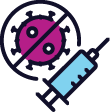Select Key Metrics on COVID-19
 COVID-19 RELATED HOSPITALIZATIONS AND DEATHS
COVID-19 RELATED HOSPITALIZATIONS AND DEATHS
Rates of hospitalizations and COVID-19 related deaths per 100,000 people.
 Vaccination Rates
Vaccination Rates
Percent of Philadelphia residents fully vaccinated against COVID-19; percent of Philadelphia residents receiving at least 1 dose of vaccine against COVID-19.
Background
Non-Hispanic Black Philadelphians have been disproportionately affected by COVID-19, facing the highest rates of hospitalization and mortality.
Source: COVID Deaths and COVID Hospitalizations by Race, Open Data Philly | July 2021.
Despite the high effectiveness of the COVID-19 vaccines in preventing hospitalization and death, rates of vaccination lag in non-Hispanic Black and lower income communities.
Source: COVID-19 Vaccine Data, City of Philadelphia Department of Public Health, Accessed August 2021.
Ongoing Efforts in the Philadelphia Community
Leaders from Penn Medicine, Mercy Catholic Medical Center, and the Philadelphia community partnered on designing and running a series of community-based clinics that vaccinated almost 3,000 people in 3 Saturdays, 85 percent of whom were Black. The effort leveraged the strengths of each partner, enabling community COVID-19 vaccine ambassadorship and locating clinics in the heart of Black communities, the development of a no/low-tech hybrid automated text message and phone-based sign-up and intake platform, and the use of a rapid-cycle innovation approach that prioritized adaptable and scalable efficiency in a variety of community settings.
Efforts listed here may be independent of Accelerate Health Equity. Check back to learn about a broader list of health equity efforts.
